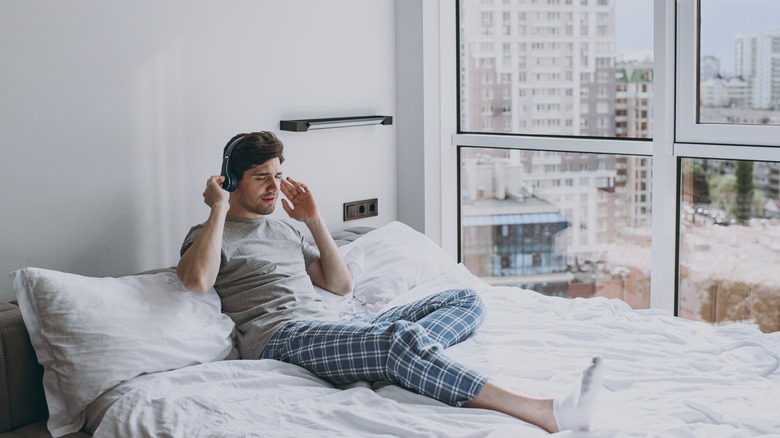Binaural Beats: The Simple Nighttime Change To Help You Sleep Soundly
For some, sleep comes naturally. If you're sufficiently tired by end of day, your eyes start to feel heavy and you drift off to sleep without a lot of difficulty. But for others, this simple nighttime activity can be more challenging. Insomnia, stress-related sleep deprivation, or lifestyle habits like drinking too much caffeine during the day and doing shift work can all contribute to poor sleep.
If you've experienced difficulty falling (and staying) asleep, you may have already tried having YouTube on in the background or listening to a relaxing podcast. After all, fixing your sleep schedule is great for your brain health. A lack of sleep can result in exhaustion, erratic moods, lack of concentration, and even health conditions like depression and high blood pressure.
In your quest to find ways to improve sleep, you may have also come across binaural beats. The basic principle behind this scientifically-studied method is that you can manipulate your brain to reach the mental state required for better sleep. How you do so is by listening to different sound frequencies in the left and right ear at the same time. For example, if you're listening to 230 Hz in your right ear and 235 Hz in your left ear, your brain creates a binaural beat of 5 Hz (the difference between both frequencies). Curious about how this can help you sleep more soundly? We have to look at how brain waves work first.
Using binaural beats for sleep is all about bringing down your brain wavelength
The neurons in our brains essentially communicate with one another via brain waves. These brain waves are what put us in different mental states at different times. They're also responsible for how we feel. Researchers have categorized five different mental states and corresponding wavelengths in our brain. They are, delta (0.5-4 Hz) which is what wavelength our brain is in when we sleep, theta (4-8 Hz) responsible for a deeply relaxed mental state, alpha (8-12 Hz) defined as a meditative and relaxing state of mind, beta (12-35 Hz) responsible for general activity levels that require our attention and focus, and gamma (35 Hz and above) which is defined as a highly focused mental state.
When you're trying to sleep soundly, what you're aiming for are the theta and delta mental states. By listening to different sound frequencies simultaneously, you essentially hack your brain into creating anywhere between 0.5-8 Hz — the ideal mental state for deep relaxation and corresponding sleep.
According to The Sleep Doctor, listening to binaural beats could also help change a person's mood so they sleep better. Do you remember the last time you were angry or sad and struggled to fall asleep? Binaural beats can help in instances like those. They can also create a relaxed state of mind that is similar to meditation — perfect for slumber.
How to use binaural beats for sound sleep
You may have noticed that YouTube has plenty of binaural beats for different mental states, but the quality of sound on this video-sharing platform can be poor. For binaural beats to work effectively, sound quality matters, so you may want to look for a streaming service that offers good quality music, and you should also use headphones or bedphones while listening.
Spotify and specific apps meant for sleep and relaxation are good sources to turn to. Two apps you can check out are Brain Waves and Atmosphere. You also want to make sure that the sound isn't too loud or too soft. What you don't want is a headache or hearing loss caused by high volume. It can feel challenging when you first try it out, especially if you've been trying to fall asleep in a quiet environment before, but being patient with the process is key. Dubslabs recommends spending at least 30 minutes every night for 21 days for the nighttime routine to be effective. Who knows? Before you know it, it might become one of those oddly satisfying things that will help you relax before going to sleep.
Staying awake at night, tossing and turning, while the rest of the world sleeps around you can feel frustrating and isolating. Why not give binaural beats a go? You don't really have anything to lose. It might change the way you view bedtime.


